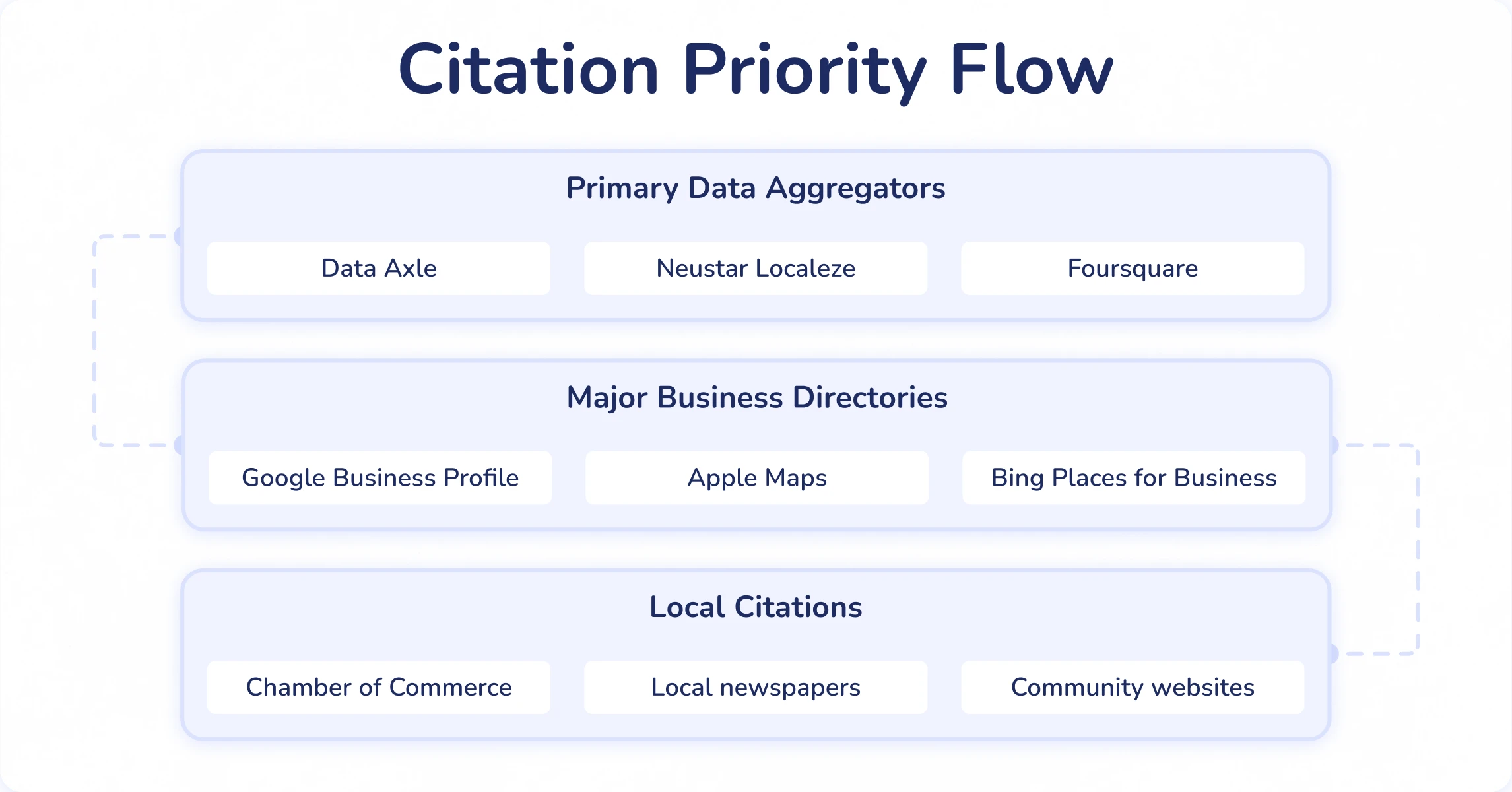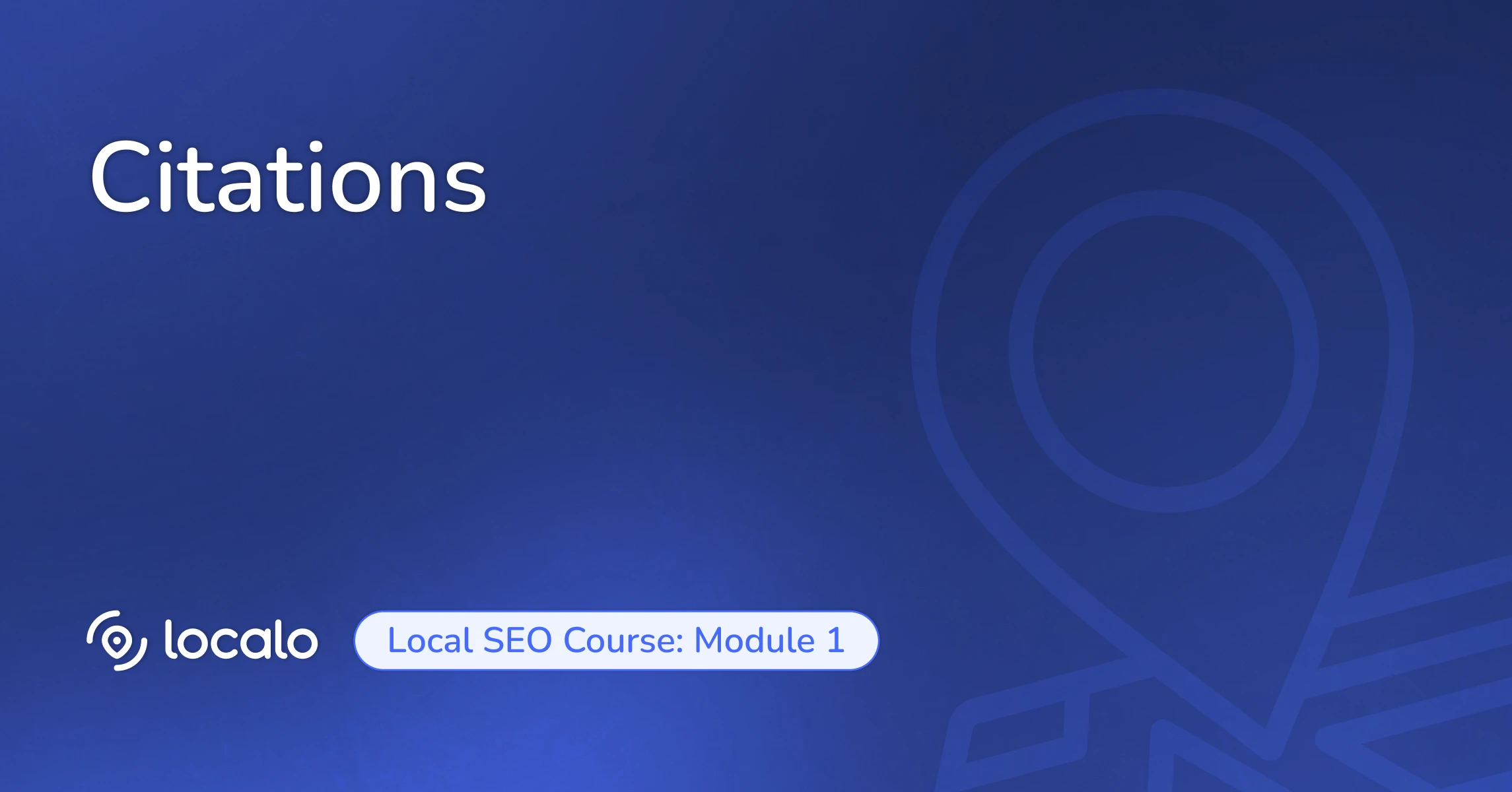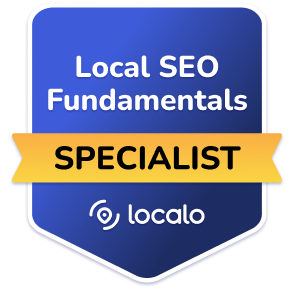Citation Signals
Citations are mentions of your business across the web. Think of each citation as a vote of confidence in your business’s legitimacy. However, quality matters more than quantity. A citation in your local Chamber of Commerce directory carries more weight than one in a generic business directory. But there’s much more to citations than just being listed in directories.
Quality Over Quantity
While it might be tempting to get your business listed in every possible directory, research from Moz shows that fewer high-quality citations are more valuable than having many low-quality ones. Think of citations like professional references on your resume – a recommendation from a respected industry leader carries more weight than multiple references from unknown sources.
Let me break down the most valuable citation sources with specific, real-world examples that matter most for local businesses:
Primary Data Aggregators
Here are the “big three” data aggregators that feed information to hundreds of other platforms:
- Data Axle - Powers Apple Maps and many in-car GPS systems
- Neustar Localeze - Supplies data to Nokia and Bing
- Foursquare - Powers Uber, Apple, and Samsung devices
Major Business Directories
These are the essential platforms every business should be listed on:
- Google Business Profile (formerly Google My Business)
- Bing Places for Business
- Apple Maps
- Yelp
- Yellow Pages
- Better Business Bureau
- Facebook Business Page
- LinkedIn Company Page
Local Citations
These are particularly valuable for local relevance:
- Chamber of Commerce websites
- Local newspapers (digital versions)
- City government business directories
- Local business associations
- Community websites
- Regional business journals
Pro Tip: Don’t try to get listed on all of these at once. Start with the major players (Google Business Profile, data aggregators) and gradually expand to industry-specific and local directories.

The Impact of Citation Consistency
Here’s something many businesses don’t realize: inconsistent citations can actually harm your local search performance. According to Moz, businesses with inconsistent NAP (Name, Address, Phone) information across citations can see their rankings drop significantly, with some experiencing up to 25% decrease in local visibility.
Let me give you a real example: if your business is “Joe’s Pizza” and it’s listed as:
- “Joe’s Pizza” on Google Business Profile
- “Joes Pizza” on Yelp
- “Joe’s Pizza Inc.” on Yellow Pages
- “Joe’s Pizzeria” on local directories
Google sees these as potentially different businesses, which dilutes your local search authority. It’s like trying to build a reputation when people keep referring to you by various names – it makes it harder for others to find and trust you.
The key is to approach citations strategically. Rather than trying to get listed everywhere, focus on platforms where your potential customers are likely to look. For instance, if you run a restaurant, being listed on major restaurant review sites and local food blogs is more valuable than being on general business directories.
Monitoring and Maintenance
One aspect that’s often overlooked is the need to monitor and update your citations regularly. Business information changes—you might move locations, change phone numbers, or update your hours. Each change needs to be reflected across all your citations to maintain consistency and trust with both search engines and customers.
Pro Tip: Keep a spreadsheet of all your citation sources to quickly update them when your business information changes. Think of this as maintaining your business’s digital footprint—the clearer and more consistent it is, the easier it is for customers to find you.
Negative Citation Signals
Think of your business citations like digital breadcrumbs that help customers find you across the internet. One of the biggest mistakes I see is when businesses move locations or change phone numbers but forget to update their information across all platforms. This inconsistency confuses both search engines and potential customers - imagine giving out business cards with different addresses! While it might seem tedious to maintain consistent information everywhere, it’s crucial for maintaining strong local visibility.
Welcome back to Localo Complete SEO Course! Today we’re exploring citations – mentions of your business across the web that include your name, address, and phone number. These citations play a crucial role in establishing your business’s legitimacy and local relevance. Let’s discover how to build and manage an effective citation strategy.
Why is quality more important than quantity for citations?
While it might be tempting to get your business listed in every possible directory, research shows that fewer high-quality citations are more valuable than having many low-quality ones. Think of citations like professional references on your resume—a recommendation from a respected industry leader carries more weight than multiple references from unknown sources. Quality citations come from authoritative, well-established directories, industry-specific platforms, local business associations, government websites and official resources, and websites with strong domain authority. These high-quality citations pass more trust and authority to your business than numerous listings on obscure or low-quality directories.
What are the primary data aggregators and why do they matter?
Primary data aggregators are the “big three” companies that feed business information to hundreds of other platforms:
First we have Data Axle, which was formerly known as Infogroup. They’re the company behind the business data you see in Apple Maps and most in-car GPS navigation systems.
Key player is Neustar Localeze, which supplies business data to Nokia maps and Microsoft’s Bing search engine.
And finally, there’s Foursquare, which might surprise you. While many people remember them as a check-in app, they’ve evolved into a major location data provider that powers business information for Uber, various Apple services, and Samsung devices.
These aggregators form the foundation of your citation ecosystem. When you establish accurate listings with these four companies, your correct business information flows downstream to many other directories and platforms.
Which major business directories are essential for local businesses?
Beyond the primary data aggregators, several major platforms deserve your special attention:
At the top of the list is Google Business Profile, which stands as the cornerstone of any local visibility strategy and should be your highest priority.
Don’t overlook Bing Places for Business – Microsoft’s search platform may have a smaller market share, but its dedicated users could become your most loyal customers.
For reaching Apple’s ecosystem, a presence on Apple Maps is essential – especially considering how many potential customers use iPhones to find local businesses on the go.
Yelp deserves particular attention as it not only attracts its own substantial audience but also feeds review data to many other services people use to make local decisions.
Despite the decline of printed phone books, the online Yellow Pages at YP.com maintains significant influence in local search, especially for service-based businesses.
The Better Business Bureau listing at BBB.org serves as an important trust signal for many consumers who specifically check a business’s standing before making purchasing decisions.
Your Facebook Business Page works double-duty as both a social proof platform and a discovery tool, especially since many consumers check social media before visiting a new business.
And finally, don’t forget your LinkedIn Company Page – while it might seem less important for consumer businesses, it’s particularly valuable for B2B companies looking to establish professional credibility.
These platforms have high domain authority, receive significant traffic, and often appear prominently in branded searches for your business.
What local citation sources deserve special attention?
Beyond the major platforms, there’s a world of locally-focused citation sources that can significantly boost your local SEO power:
Your local Chamber of Commerce website is a gold mine for local credibility. Getting listed here tells both Google and customers that you’re a legitimate, established business in the community.
Don’t underestimate the power of digital versions of local newspapers. Being mentioned or listed in these trusted local publications provides not just visibility, but valuable authority that’s tied directly to your specific location.
Many people don’t realize that city government websites often maintain business directories. These highly trusted official listings send particularly strong signals about your local legitimacy.
Membership directories from local business associations are especially valuable because they’re selective – not every business can get listed, which makes them more powerful trust signals.
Community websites like neighborhood blogs, local event calendars, and area resource guides provide relevant, targeted visibility to the very people most likely to become your customers.
Finally, regional business journals often maintain directories of local companies. These publications typically have high credibility and reach decision-makers in your community.
These local citations are particularly valuable because they reinforce your connection to your specific geographic area in a way that national directories simply can’t match.
How does citation consistency impact your local visibility?
Here’s something many businesses don’t realize: inconsistent citations can actually harm your local search performance. According to industry research, businesses with inconsistent N-A-P (Name, Address, Phone) information across citations can see their rankings drop significantly, with some experiencing up to 25% decrease in local visibility.
If your business is “Joe’s Pizza” and it’s listed as:
“Joe’s Pizza” on Google Business Profile
“Joes Pizza” (missing apostrophe) on Yelp
“Joe’s Pizza Inc.” on Yellow Pages
“Joe’s Pizzeria” on local directories
Google sees these as potentially different businesses, which dilutes your local search authority. It’s like trying to build a reputation when people keep referring to you by slightly different names—it makes it harder for others to find and trust you.
The key is to approach citations strategically. Rather than trying to be everywhere, focus on platforms where your potential customers are likely to look. For instance, if you run a restaurant, being listed on major restaurant review sites and local food blogs is more valuable than being on general business directories.
Why is citation monitoring and maintenance essential?
One aspect that’s often overlooked is the need to monitor and update your citations regularly. Business information changes—you might move locations, change phone numbers, or update your hours. Each change needs to be reflected across all your citations to maintain consistency and trust with both search engines and customers.
Pro Tip: Keep a spreadsheet of all your citation sources to quickly update them when your business information changes. Think of this as maintaining your business’s digital footprint—the clearer and more consistent it is, the easier it is for customers to find you.
What negative citation signals should you avoid?
Think of your business citations like digital breadcrumbs that help customers find you across the internet. One of the biggest mistakes I see is when businesses move locations or change phone numbers but forget to update their information across all platforms. This inconsistency confuses both search engines and potential customers - imagine giving out business cards with different addresses!
While it might seem tedious to maintain consistent information everywhere, it’s crucial for maintaining strong local visibility.
Other negative citation signals to avoid include:
- Creating duplicate listings on the same platform.
- Using fake addresses or virtual offices in citations.
- Listing incorrect or disconnected phone numbers.
- Having major discrepancies in business name formatting.
- Neglecting to remove outdated citations for closed locations.
Each of these issues can undermine trust with both search engines and customers, potentially harming your local search performance.
In our next lesson, we’ll explore link building for local SEO and how to align your local and traditional SEO strategies for maximum impact. Thank you for joining me today, and I’ll see you in the next video!
The websites and Google Business Profiles used throughout the course are for educational purposes only. We're not affiliated with these businesses and don't claim any endorsement from them. All trademarks belong to their owners. Some examples include visual changes (made with browser tools) to help illustrate the SEO concepts we're teaching. These edits are strictly local and illustrative of specific SEO concepts. They don't affect the original websites.




